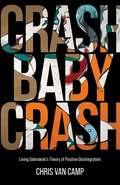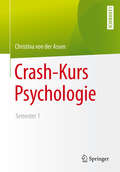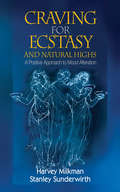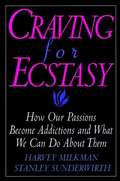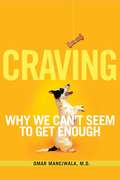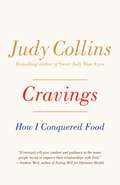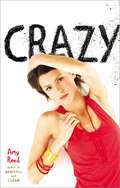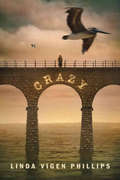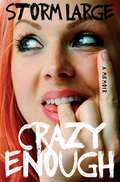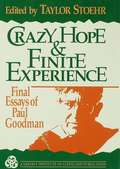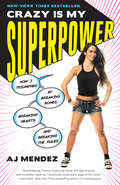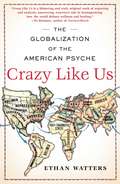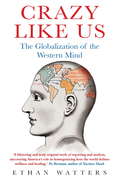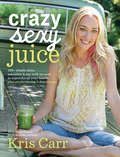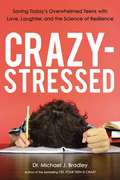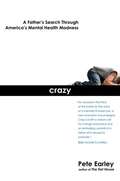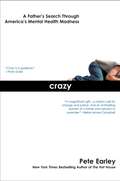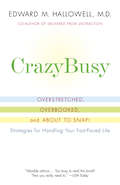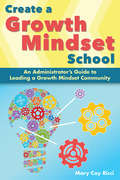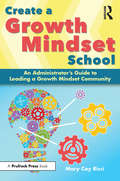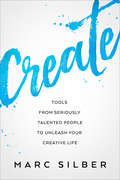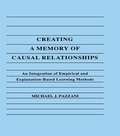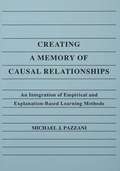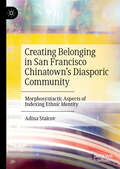- Table View
- List View
Crash Baby Crash: Living Dabrowski's Theory of Positive Disintegration
by Chris Van CampDo you know deep emotional darkness as well as peak experiences? Do you often feel like an outcast?Then this book is the gamechanger you need. Crash Baby Crash is a courageous book about autonomy and nonconformism, about pe
Crash-Kurs Psychologie: Semester 1
by Christina AssenDer ,,Crash-Kurs Psychologie" gibt einen umfassenden Einblick in die verschiedenen Bereiche der Psychologie. Dieser erste von sechs Bänden bietet einen hervorragenden Einstieg in die Grundlagenfächer der Psychologie. Dank der allgemeinverständlichen Darstellung dient dieses lernskriptartige Werk als Crash-Kurs, das sowohl interessant und anschaulich, wie auch wissenschaftlich fundiert ist. Neben aktuellen Forschungsbeispielen, historisch-bedeutsamen Studienergebnissen, prägnant formulierten und zentrale Aussagen der Psychologie veranschaulichen zahlreiche Abbildungen den Inhalt des ersten Bandes. Zusammenfassungen eines jeden Kapitels, Tipps zur weiterführenden Literatur, sowie die vielen Übungsfragen und das detaillierte Glossar runden dieses Einstiegswerk in die Psychologie ab.
Craving for Ecstasy and Natural Highs: A Positive Approach to Mood Alteration
by Dr Harvey B. Milkman Stanley G. Sunderwirth"This book is extremely useful for a broad range of readers. This book reflects the extensive scientific and clinical expertise of the authors and is compelling reading for anyone interested in addictive behaviors. It is one of the rare books that from page one immediately engrosses, educates and broadens your perspective." —Alex Blaszczynski, The University of Sydney, International Journal of Mental Health Addiction"Psychologist Harvey Milkman and chemist Stanley Sunderwirth explore why our relentless search for pleasure sometimes leads to dangerous addictions and show us healthy ways to achieve happiness." —SCIENTIFIC AMERICAN MIND"Harvey B. Milkman and Stanley Sunderwirth have written a tour de force. Craving for Ecstasy and Natural Highs: A Positive Approach to Mood Alteration . . . is a beautifully written and organized book . . . a thrill ride through the most innovative and insightful perspectives that science and clinical experience have to offer . . . hip and artistic, reflecting a deep understanding of addiction . . . a major contribution to the field; it is must reading." —Howard J. Shaffer, PhD, CAS Editor, Psychology of Addictive Behaviors, Associate Professor, Harvard Medical School Director, Division on Addictions, Cambridge Health Alliance "Reading this book is in itself and ecstatic experience! . . . a fascinating journey that explores the benefits and risks of pleasure and the universal desire to feel good . . . It's quite a trip." —G. Alan Marlatt, PhD, University of Washington People from all walks of life often lose themselves in pursuing counterfeit pleasures—cigarettes, alcohol, drugs, thrill seeking, sex, food, gambling, and on-line fantasies to name just a few. How does the pursuit of pleasure result in compulsion and loss of control? Craving for Ecstasy and Natural Highs addresses this fundamental question and then explores positive ways to achieve lasting happiness and fulfillment. Readers will gain important insight on how to improve their own quality of life and will learn how to offer support to clients, students, family, and friends whose lives may be compromised by addiction. Students of addictive behaviors and anyone interested in discovering healthy means to satisfy the drive to alter consciousness will find this book compelling. View Harvey Milkman's appearance on local Denver TV where he talks about addiction and his book at http://www.kdvr.com/videobeta/watch/?watch=dafef79e-c409-4159-82b4-194ecd3b9929&src=frontBe sure to follow Harvey Milkman's blog on Psychology Today at http://www.psychologytoday.com/blog/better-dope/200909/better-dope-natural-highs-the-cutting-edge-mood-alterationReviews of previous work: "The chemistry and psychology of addiction are described with considerable insight. . . . These authors know their stuff and make a compelling case." —The Los Angeles Times "The authors provide a valuable service by placing into perspective a large array of behaviors that could be considered addictive." —JAMASAGE offers treatment and training programs for mental health providers that you can easily incorporate into your existing programs. Visit www.sagepub.com/satreatments to learn more about these treatment and training programs.
Craving for Ecstasy: How Our Passions Become Addictions and What We Can Do About Them
by Harvey Milkman Stanley SunderwirthAlcohol, tobacco, sex, food. . .escape the pleasure trap and regain control of your life! The chemistry and psychology of addiction are described with considerable insight. These authors know their stuff, and they make a compelling case. . . .All in all, Craving for Ecstasy is a challenging, well-considered analysis. -Los Angeles Times. Milkman and Sunderwirth offer a new and different perspective from which to understand a very complex and confusing pattern of human behavior. Their ideas are vibrant, provocative, stimulating, and written for a public that is demanding a better explanation. -Howard J. Shaffer, director, Center for Addiction Studies, Department of Psychiatry, Harvard Medical School and The Cambridge Hospital. Addictive behavior goes far beyond the compulsive use of drugs and alcohol. It is possible to become addicted to what may seem a harmless pleasure such as sex, jogging, watching television, or eating. In this powerful book?written in easy-to-understand language, two scientific researchers, Harvey Milkman and Stanley Sunderwirth, explain the biology, chemistry, and psychology of the universal desire for pleasure and escape. For example, they reveal how the brain produces mind-altering substances and what the skydiver has in common with the heroin addict. But, most importantly, with the use of a self-assessment test and an invaluable guide for treatment, the authors show what steps you can take to regain control of your life.
Craving: Why We Can't Seem to Get Enough
by Omar ManejwalaA nationally recognized expert on compulsive behaviors explains the phenomenon of craving and gives us tools to achieve freedom from our seemingly insatiable desires by changing our actions to remap our brains.When we find ourselves wanting something strong enough, we’ll do just about anything to get it--sometimes at the expense of our bodies, brains, bank accounts, and relationships. So why do we sometimes have the irrepressible feeling that we need something--such as food, cigarettes, alcohol, or sex--that we really just want? And how do we satiate that feeling without indulging it?In Craving, Omar Manejwala, M.D., translates the neurobiology of this phenomenon into real and accessible terms, explaining why we just can’t seem to get enough. He then gives us tools and guidance to find satisfaction without giving in to our cravings. Dr. Manejwala explains:how and why our brain drives behaviorhow to change the part of our brain that fuels our cravingsthe warning signs that craving is evolving into addictionwhy craving is the most difficult component of addiction to addresswhy self-help and spiritual groups that use models like the Twelve Steps are so effective at changing behaviors, receiving encouragement, and remaining accountable.
Cravings: How I Conquered Food
by Judy CollinsA no-holds-barred account of folk legend Judy Collins's harrowing struggle with compulsive overeating and of the journey that led her to a solution. Since childhood Judy Collins has had a tumultuous, fraught relationship with food. Her issues with overeating nearly claimed her career and her life. For decades she thought she simply lacked self-discipline. She tried nearly every diet plan that exists, often turning to alcohol to dull the pain of yet another failed attempt to control her seemingly insatiable cravings. Today, Judy knows she suffers from an addiction to sugar and grains, flour and wheat. She adheres to a strict diet of unprocessed foods consumed in carefully measured portions. This solution has allowed her to maintain a healthy weight for years, to enjoy the glow of good health, and to attain peace of mind. Alternating between chapters on her life and those of the many diet gurus she has encountered along the way (Atkins, Jean Nidetch of Weight Watchers, Andrew Weil, to name a few), Cravings is the culmination of Judy's genuine desire to share what she's learned—so that no one else has navigate her heart-rending path to recovery.
Crazy
by Amy ReedHe’s falling in love—and she’s falling over the edge of sanity. From the author of Beautiful and Clean, a “real and relatable” (VOYA) exploration of a romance marred by mental illness.What if I can’t ever be who you want me to be? Connor knows that Izzy will never fall in love with him the way he’s fallen for her. But somehow he’s been let into her crazy, exhilarating world and become her closest confidante. The closer they get, however, the more Connor realizes that Izzy’s highs are too high and her lows are too low. And the frenetic energy that makes her shine is starting to push her into a much darker place. As Izzy’s behavior gets increasingly erratic and self-destructive, Connor gets increasingly desperate to stop her from plummeting. He knows he can’t save her from her pain...but what if no one else can?
Crazy
by Linda Vigen PhillipsA compelling novel in verse about mental illness Laura is a typical fifteen-year-old growing up in the 1960s, navigating her way through classes, friendships, and even a new romance. But she&’s carrying around a secret: her mother is suffering from a mental illness. No one in Laura&’s family will talk about her mother&’s past hospitalizations or increasingly erratic behavior, and Laura is confused and frightened. Laura finds some refuge in art, but when her mother suffers a breakdown after taking painting back up again herself, even art ceases to provide much comfort. Eloquent and compelling, this powerful novel-in-verse tackles complex themes in a way that will have readers rooting for Laura to find the courage to get the answers she needs.
Crazy Enough
by Storm LargeYes, Storm Large is her real name, though she's been called many things. As a performer, the majority of descriptions have led with "Amazon," "Powerhouse," "a six-foot Vargas pinup come to life." Playboy called her a "punk goddess." You'd never know she used to be called "Little S"--the mini-me to her beautiful and troubled mother, Suzi. Storm spent most of her childhood visiting her mother in mental institutions and psych wards. Suzi's diagnosis changed with almost every doctor visit, ranging from schizophrenia to bipolar disorder to multiple personality disorder to depression. As hard as it was not having her at home, Storm and her brothers knew that it was a lot safer to have their beautiful but unreliable mom in a facility somewhere. Then one day, nine-year-old Storm jokingly asked one of her mother's doctors, "I'm not going to be crazy like that, right?" To which he replied, "Well, yes. It's hereditary. You absolutely will end up like your mother. But not until your twenties." That was the starting gun for a wild race to escape what Storm believed to be her future. Desperate to delay the lonely sickness and sadness that haunted her mother, Storm stomped her size-twelve boots straight toward as much sex, drugs, and rock 'n' roll as she could find. Losing her virginity at thirteen, she sprinted through her young life, trying to smoke and fuck and wail away the madness that she feared would catch up to her at any moment. Instead, she found herself deep in a life of craziness of her own making. Then, in her twenties, with nothing to live for and a growing heroin addiction, Storm accepted a chance invitation to sing with a friend's band. That night she reconnected with her long-term love of music, and it dragged her back from the edge. She has been singing and slinging inappropriate banter at audiences worldwide ever since. Storm's story of growing up with a mental time bomb hanging around her neck veers from frightening to inspiring, sometimes all in one sentence. But her strength, charisma, and raw musical talent gave her the will to overcome it all. With tremendous honesty and tremendous dirty language, Crazy Enough is about an artist's journey of realizing that the mistakes that make, break, and remake us are worth far more than our flailing attempts to live a life we think is "normal." It is a love song to the twisted, flawed parts in all of us and a nod to the grace we find when things fall apart.
Crazy Enough: A Memoir
by Storm LargeYes, Storm Large is her real name, though she's been called many things. As a performer, the majority of descriptions have led with "Amazon," "powerhouse," "a six-foot Vargas pinup come to life." Playboy called her a "punk goddess." You'd never know she used to be called "Little S"--the mini-me to her beautiful and troubled mother, Suzi. Little S spent most of her childhood visiting her mother in mental institutions and psych wards. Suzi's diagnosis changed with almost every doctor's visit, ranging from schizophrenia to bipolar disorder to multiple personality disorder to depression. One day, nine-year-old Little S jokingly asked one of her mother's doctors, "I'm not going to be crazy like that, right?" To which he replied, "Well, yes. It's hereditary. You absolutely will end up like your mother. But not until your twenties." Storm's story of growing up with a mental time bomb hanging over her veers from frightening to inspiring, sometimes all in one sentence. But her strength, charisma, and raw musical talent gave her the will to overcome it all. Crazy Enough is a love song to the twisted, flawed parts in all of us.
Crazy Hope and Finite Experience: Final Essays of Paul Goodman
by Taylor StoehrFrom the publication of Growing Up Absurd in 1960 until his death in 1972, Paul Goodman had the ear of the young radicals of the New Left, pouring forth books and articles on education, technology, decentralization, and of course, the war in Vietnam. Yet Goodman saw himself primarily as an artist rather than a political thinker or sociologist, and many of his books, even during the 1960s, were works of poetry, drama, and fiction. He had also practiced as a psychotherapist and joined with Frederick Perls and Ralph Hefferkine in producing a new synthesis in psychological thought, Gestalt therapy, which has since become an international movement. In an age of specialization, few writers have taken on so braod a range of concerns. Crazy Hope and Finite Experience is the final summing up of the thought and life of a self-described "old-fashioned man of letters." This book brings together for the first time five personal essays, all written near the end of his life, in which Goodman discusses his sense of the world and how he was "in" it, his politics, his spiritual and religious attitude, his sexuality, and his calling as a literary artist. For those already familiar with one or another aspect of his work, Goodman's self-assessment will provide new insight into the credo that underlies his whole career. For those learning about him for the first time, it offers a vivid sense of the man and his perspective. And for psychotherapists - especially Gestalt therapists - the book will fill in the picture of Goodman as a theorist whose work was crucial to the development of a new approach to therapy.
Crazy Is My Superpower: How I Triumphed by Breaking Bones, Breaking Hearts, and Breaking the Rules
by A.J. Mendez BrooksRecently retired WWE superstar AJ Mendez Brooks is a powerhouse—strong, quirky, and totally confident. But that wasn’t always the case. With humor and tremendous heart, she opens up for the first time about her harrowing struggle to understand her demons and the diagnosis that helped her gain control over her life. Everything I was told should be my greatest insecurities and weaknesses, everything that I’ve been labeled—SHORT, NERDY, SKINNY, WEAK, IMPULSIVE, UGLY, TOMBOY, POOR, REBEL, LOUD, FREAK, CRAZY—turned out to be my greatest strengths. I didn’t become successful in spite of them. I became successful because of them. Growing up AJ was a quiet girl trying to act “normal” when she felt anything but. As her family struggled with drug addiction, poverty, and mental illness, she found escape through comic books and video games, and was inspired by the tough and unconventional female characters. It wasn’t until she discovered pro wrestling that she learned superheroes could be real. Determined to become the superhero she’d always admired, AJ trained and sacrificed for years to achieve her dream of wrestling professionally. Yet she quickly faced industry pressure to play the role of the damsel in distress and to dress more provocatively to cater to male fans. But she fought back and created an ass-kicking alter ego that was a genuine representation of herself: nerdy, enthusiastic, and a little bit crazy. With humor and tremendous heart, AJ opens up for the first time about her harrowing struggle to understand her demons and the mental illness diagnosis that helped her gain control over her life. What most people view as a hardship, AJ embraced as inspiration for her superhero persona, shattering the stigma attached to mental illness. Charting her journey from a scrappy girl in an unstable home to an empowered wrestling champion, Crazy Is My Superpower is an unflinchingly honest story and brave confessional about her long road to self-acceptance.
Crazy Like Us: The Globalization of the American Psyche
by Ethan WattersIt is well known that American culture is a dominant force at home and abroad; our exportation of everything from movies to junk food is a well-documented phenomenon. But is it possible America's most troubling impact on the globalizing world has yet to be accounted for? In Crazy Like Us, Ethan Watters reveals that the most devastating consequence of the spread of American culture has not been our golden arches or our bomb craters but our bulldozing of the human psyche itself: We are in the process of homogenizing the way the world goes mad. America has been the world leader in generating new mental health treatments and modern theories of the human psyche. We export our psychopharmaceuticals packaged with the certainty that our biomedical knowledge will relieve the suffering and stigma of mental illness. We categorize disorders, thereby defining mental illness and health, and then parade these seemingly scientific certainties in front of the world. The blowback from these efforts is just now coming to light: It turns out that we have not only been changing the way the world talks about and treats mental illness -- we have been changing the mental illnesses themselves. For millennia, local beliefs in different cultures have shaped the experience of mental illness into endless varieties. Crazy Like Us documents how American interventions have discounted and worked to change those indigenous beliefs, often at a dizzying rate. Over the last decades, mental illnesses popularized in America have been spreading across the globe with the speed of contagious diseases. Watters travels from China to Tanzania to bring home the unsettling conclusion that the virus is us: As we introduce Americanized ways of treating mental illnesses, we are in fact spreading the diseases. In post-tsunami Sri Lanka, Watters reports on the Western trauma counselors who, in their rush to help, inadvertently trampled local expressions of grief, suffering, and healing. In Hong Kong, he retraces the last steps of the teenager whose death sparked an epidemic of the American version of anorexia nervosa. Watters reveals the truth about a multi-million-dollar campaign by one of the world's biggest drug companies to change the Japanese experience of depression -- literally marketing the disease along with the drug. But this book is not just about the damage we've caused in faraway places. Looking at our impact on the psyches of people in other cultures is a gut check, a way of forcing ourselves to take a fresh look at our own beliefs about mental health and healing. When we examine our assumptions from a farther shore, we begin to understand how our own culture constantly shapes and sometimes creates the mental illnesses of our time. By setting aside our role as the world's therapist, we may come to accept that we have as much to learn from other cultures' beliefs about the mind as we have to teach.
Crazy Like Us: The Globalization of the Western Mind
by Ethan WattersIt is well-known that US culture is a dominant force and a world-wide phenomenon. But it is possible that its most troubling export has yet to be accounted for? America has been the world leader in generating new mental health treatments and modern theories: it exports psychopharmaceuticals and categorises disorders, thereby defining mental illness and health. The outcome of these efforts is just now coming to light: it turns out that the US has not only been changing the way the world talks about and treats mental illness -- it has been changing the mental illnesses themselves.Watters travels from China to Tanzania to bring home the unsettling conclusion that the virus is the US: as Americanized ways of treating mental illnesses are introduced, they are is fact spreading the diseases and shaping, if not creating, the mental illnesses of our time.
Crazy Sexy Juice: 100+ Simple Juice, Smoothie & Nut Milk Recipes To Supercharge Your Health
by Kris CarrWelcome to a juicing and blending adventure! If you’ve picked up this book, it’s likely that you’re looking to bring more zing into your life. Perhaps you’re feeling a little tired. Bloated. Out of sorts. Whatever it is, you’ve come to the right place. Get ready to say good-bye to feeling meh and hello to feeling fabulous! In Crazy Sexy Juice, wellness advocate and New York Times best-selling author Kris Carr teaches you everything you need to know about creating fresh, nutritious juices and smoothies, and creamy, indulgent nut and seed milks. With enough recipes to keep your juicer and blender humming through every season, she shows you how to fit them into your life, helping you make health deposits—instead of withdrawals! Cha-ching! She guides you through her wonderful world by teaching you: How to create flavor combinations that tantalize your taste buds How to choose the best juicer, blender, and kitchen tools Ways to save money while prioritizing fresh, organic produce Troubleshooting advice for common kitchen mishaps Tips for selection, storage, and preparation of ingredients Answers to frequently asked questions and health concerns Suggestions for juicing and blending on the go Tips on how to get your family onboard and make this lifestyle stick And oh, so much more… Whether you’re an old pro at making liquid magic or just starting out, Kris will help you experience juicing and blending as a fun and delicious journey into the transformative powers of fruits and veggies! By simply adding these nutrient-dense beverages to your daily life, you can take control of your health—one sip at a time. With more than 100 scrumptious recipes and oodles of information, you’ll be ready to dive into a juicing paradise. Cheers to that! Includes an easy and energizing 3-day cleanse!
Crazy-Stressed: Saving Today's Overwhelmed Teens with Love, Laughter, and the Science of Resilience
by Michael BradleyA guide for saving today&’s overwhelmed teens through love, laughter, and the power of resilience.A little resilience goes a long way, peel back the cheerful facade that parents present, and you'll find that many are worried about their teens. Mood swings, impulsiveness, poor judgment, and other problems peak in these years. Add stressors such as screen addiction, cyberbullying, increasing academic demands, and time-consuming athletic commitments…and it's no surprise that today's teenagers rank as the most anxious in 50 years. Parents long to help, but how?Based on a career counseling kids and their parents, psychologist Michael Bradley locates the most powerful protective trait: resilience. Teens with this crucial quality know how to handle difficulty, overcome obstacles, and bounce back from setbacks.Packed with insights from neuroscience and psychology, real-life case studies, and a dose of humor, Crazy-Stressed sheds light on the teen brain and offers a wealth of resiliency-boosting strategies. In it, Dr. Bradley reveals:What kids these days are really going throughWays to strengthen the seven skills every teen needs to survive and thriveWhat-to-do-when suggestions for common behavior, school, and social issuesTactics for coping with conflict, teaching consequences, improving communication, staying connected, and moreIt's not easy being a teen-and it's certainly not easy parenting one. Always frank and often funny, Crazy-Stressed will become your go-to guide…and your teens may even thank you for it.
Crazy: A Father's Search Through America's Mental Health Madness
by Pete EarleyFrom the Publisher: Pete Earley had no idea. He'd been a journalist for over thirty years, and the author of several award-winning-even bestselling-nonfiction books about crime and punishment and society. Yet he'd always been on the outside looking in. He had no idea what it was like to be on the inside looking out until his son, Mike, was declared mentally ill, and Earley was thrown headlong into the maze of contradictions, disparities, and catch-22s that is America's mental health system. The more Earley dug, the more he uncovered the bigger picture: Our nation's prisons have become our new mental hospitals. Crazy tells two stories. The first is his son's. The second describes what Earley learned during a yearlong investigation inside the Miami-Dade County jail, where he was given complete, unrestricted access. There, and in the surrounding community, he shadowed inmates and patients; interviewed correctional officers, public defenders, prosecutors, judges, mental-health professionals, and the police; talked with parents, siblings, and spouses; consulted historians, civil rights lawyers, and legislators. The result is both a remarkable piece of investigative journalism, and a wake-up call-a portrait that could serve as a snapshot of any community in America.
Crazy: A Father's Search Through America's Mental Health Madness (Playaway Adult Nonfiction Ser.)
by Pete EarleyFormer Washington Post reporter Pete Earley had written extensively about the criminal justice system. But it was only when his own son-in the throes of a manic episode-broke into a neighbor's house that he learned what happens to mentally ill people who break a law. This is the Earley family's compelling story, a troubling look at bureaucratic apathy and the countless thousands who suffer confinement instead of care, brutal conditions instead of treatment, in the "revolving doors" between hospital and jail. With mass deinstitutionalization, large numbers of state mental patients are homeless or in jail-an experience little better than the horrors of a century ago. Earley takes us directly into that experience-and into that of a father and award-winning journalist trying to fight for a better way.
CrazyBusy
by Edward M. HallowellAre you too busy? Are you always running behind? Is your calendar loaded with more than you can possibly accomplish? Is it driving you crazy? You’re not alone. CrazyBusy–the modern phenomenon of brain overload–is a national epidemic. Without intending it or understanding how it happened, we’ve plunged ourselves into a mad rush of activity, expecting our brains to keep track of more than they comfortably or effectively can. In fact, as Attention Deficit Disorder expert and bestselling author Edward M. Hallowell, M. D. , argues in this groundbreaking new book, this brain overload has reached the point where our entire society is suffering from culturally induced ADD. CrazyBusy is not just a by-product of high-speed, globalized modern life–it has become its defining feature. BlackBerries, cell phones, and e-mail 24/7. Longer work days, escalating demands, and higher expectations at home. It all adds up to a state of constant frenzy that is sapping us of creativity, humanity, mental well-being, and the ability to focus on what truly matters. But as Dr. Hallowell argues, being crazybusy can also be an opportunity. Just as ADD can, if properly managed, become a source of ingenuity and inspiration, so the impulse to be busy can be turned to our advantage once we get in touch with our needs and take charge of how we really want to spend our time. Through quick exercises (perfect for busy people), focused advice on everything from lifestyle to time management, and examples chosen from his extensive clinical experience, Hallowell goes step-by-step through the process of unsnarling frantic lives. With CrazyBusy, we can teach ourselves to move from the F-state–frenzied, flailing, fearful, forgetful, furious–to the C-state–cool, calm, clear, consistent, curious, courteous. Dr. Hallowell has helped more than a million readers free themselves of the distractions and compulsions of ADD. Now in CrazyBusy, he offers the same sound, sane, and accessible guidance for anyone suffering from the harried pace of modern life. If you find yourself pulled into a million different directions, here at last is the opportunity to stop being busy, start being happy, and still get things done.
Create a Growth Mindset School: An Administrator's Guide to Leading a Growth Mindset Community
by Mary Cay RicciPrincipals and district administrators will learn ways to develop, sustain, monitor, and lead schools and districts striving for growth mindset learning environments. The book will include guidance in the areas of: growth mindset hiring, feedback, systemic professional learning, and ways to evaluate present processes and protocols through a growth mindset lens. Guidance and suggestions for embedding growth mindset learning through curriculum, instruction, and grading will also be included. Anticipated barriers for implementation will be discussed, as well as suggestions for addressing these barriers. Attributes of growth mindset leaders will also be presented in this guidebook for leading in a growth mindset district!
Create a Growth Mindset School: An Administrator's Guide to Leading a Growth Mindset Community
by Mary Cay RicciPrincipals and district administrators will learn ways to develop, sustain, monitor, and lead schools and districts striving for growth mindset learning environments. This book includes guidance in the areas of growth mindset hiring, feedback, systemic professional learning, and ways to evaluate present processes and protocols through a growth mindset lens. A mindset reflection tool allows education leaders to consider their own mindset thinking. Guidance and suggestions for embedding growth mindset learning through curriculum, instruction, and grading are also included in this valuable resource. Attributes of growth mindset leaders are presented in this guidebook for leading in a growth mindset district!
Create: Tools from Seriously Talented People to Unleash Your Creative Life
by Marc SilberCreative conversations from some of the world&’s top photographers, filmmakers, Grammy award winners, TED presenters, actors, CEOs and more! Many of us think of creativity as something distant and incompatible with daily life—a skill that artists get to use, but not the rest of us. Maybe you feel like a land-locked surfer, yearning for exhilarating rides. Or maybe you live for the few hours a week when you can take photographs, paint, or write. It&’s time for a new mindset. Create shows you how to rediscover the artist within you. People who make a living in the creative arts know that there is a cycle to unlocking the imagination. Visualize, know your tools, work your craft, refine, share. When you tap into this cycle, you&’ll find ways to operate at your highest state in all aspects of life. Overcoming the barriers to innovation is easier than you think. Marc Silber—bestselling author, award-wining creative and educator—shows you how to avoid the traps of procrastination, overthinking, and self-doubt. The exercises in Create are specifically designed to help you find certainty and confidence in self-expression. Learn how to: · Master the techniques of visualization · Draw inspiration from the world around you · Collaborate with people who can further your vision · Share with others to spread the joy &“Take it from someone who has been an educator in the arts for decades: if you want a more artistic and fun life, you&’re holding the book that will do it (plus, you&’ll love Marc&’s delightful and engaging writing style). Highly recommended.&” —Scott Kelby, author of The Digital Photography Book
Creating A Memory of Causal Relationships: An Integration of Empirical and Explanation-based Learning Methods
by Michael J. PazzaniThis book presents a theory of learning new causal relationships by making use of perceived regularities in the environment, general knowledge of causality, and existing causal knowledge. Integrating ideas from the psychology of causation and machine learning, the author introduces a new learning procedure called theory-driven learning that uses abstract knowledge of causality to guide the induction process. Known as OCCAM, the system uses theory-driven learning when new experiences conform to common patterns of causal relationships, empirical learning to learn from novel experiences, and explanation-based learning when there is sufficient existing knowledge to explain why a new outcome occurred. Together these learning methods construct a hierarchical organized memory of causal relationships. As such, OCCAM is the first learning system with the ability to acquire, via empirical learning, the background knowledge required for explanation-based learning. Please note: This program runs on common lisp.
Creating A Memory of Causal Relationships: An Integration of Empirical and Explanation-based Learning Methods
by Michael J. PazzaniThis book presents a theory of learning new causal relationships by making use of perceived regularities in the environment, general knowledge of causality, and existing causal knowledge. Integrating ideas from the psychology of causation and machine learning, the author introduces a new learning procedure called theory-driven learning that uses abstract knowledge of causality to guide the induction process. Known as OCCAM, the system uses theory-driven learning when new experiences conform to common patterns of causal relationships, empirical learning to learn from novel experiences, and explanation-based learning when there is sufficient existing knowledge to explain why a new outcome occurred. Together these learning methods construct a hierarchical organized memory of causal relationships. As such, OCCAM is the first learning system with the ability to acquire, via empirical learning, the background knowledge required for explanation-based learning. Please note: This program runs on common lisp.
Creating Belonging in San Francisco Chinatown’s Diasporic Community: Morphosyntactic Aspects of Indexing Ethnic Identity
by Adina StaicovThis book presents a much-needed discussion on ethnic identification and morphosyntactic variation in San Francisco Chinatown—a community that has received very little attention in linguistic research. An investigation of original, interactive speech data sheds light on how first- and second-generation Chinese Americans signal (ethnic) identity through morphosyntactic variation in English and on how they co-construct identity discursively. After an introduction to the community’s history, the book provides background information on ethnic varieties in North America. This discussion grounds the present book within existing research and illustrates how studies on ethnic varieties of English have evolved. The book then proceeds with a description of quantitative and qualitative results on linguistic variation and ethnic identity. These analyses show how linguistic variation is only one way of signalling belonging to a community and highlight that Chinese Americans draw on a variety of sources, most notably the heritage language, to construct and negotiate (ethnic) identity. This book will be of particular interest to linguists - particularly academics working in sociolinguistics, language and identity, and language variation - but also to scholars interested in related issues such as migration, discrimination, and ethnicity.
